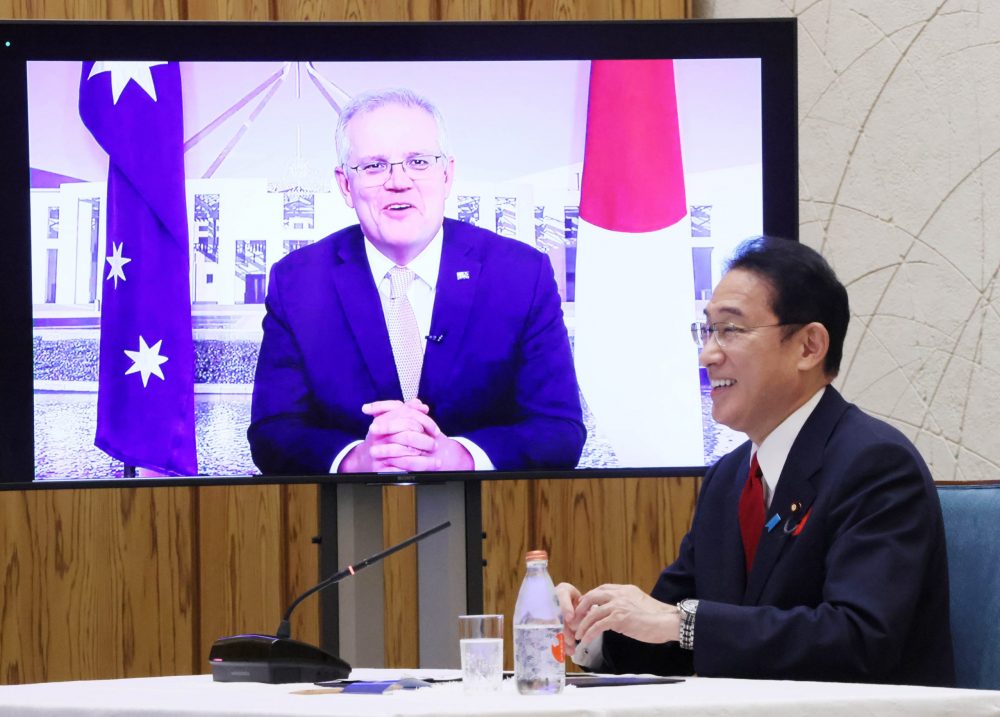Japan ‘more than willing’ to help ensure AUKUS success

Japan’s ambassador in Canberra has indicated his country will provide assistance to Australia, the United Kingdom and the United States to ensure the AUKUS agreement is a successful one.
In an interview with ASPI Executive Director Peter Jennings, Shingo Yamagami said while AUKUS’s initial focus would be Australia’s acquisition of nuclear-powered submarines, Japan could help in other areas flagged in the agreement such as artificial intelligence, cybersecurity and quantum technologies.
‘We have been told there are some instances or areas where AUKUS members may need Japanese cooperation and participation and we are more than willing to do our contribution.’
The ambassador said his country’s welcoming of AUKUS at the highest levels has come because it will help to bolster deterrence and therefore stability in the Indo-Pacific region.
‘The key message is deterrence; here Australia and Japan can do a lot more in terms of contributing to peace and stability in our region.’
The Quadrilateral Security Dialogue involving Australia and Japan as well as the US and India is also important in this respect, and Yamagami said it was heartening to see the Quad had now reached a commitment at the level of an annual leaders’ meeting when not long ago it was restricted to officials.
The countries have made pledges beyond traditional security, including to provide a billion Covid-19 vaccine does by the end of 2022.
He said the Quad was a vehicle for promoting a ‘free and open Indo-Pacific’ and that there was a lot of room for cooperation with like-minded countries in Southeast Asia and Europe.
‘Quad is not an exclusive club, Quad is not an Asian NATO.
‘Quad is more than China. We are looking at the bigger picture, we are looking at the regional order—how to maintain the rules-based order, how to maintain peace and prosperity and security for all in the region.’
Deterrence is necessary to uphold that order when it’s challenged by emerging powers like China undertaking unilateral attempts to change the status quo.
It was expected that China would abide by the rules of the World Trade Organization and not engage in a campaign of economic coercion against Australia, for example, as well as accept the rulings of the UN tribunal that in 2016 rejected China’s claims on the South China Sea.
‘So it’s fair to say many observers are so disappointed and we have to ask were our expectations satisfied? If not, how can we achieve it?
‘We would like to welcome them into the rules-based order, but at the same time if rules are not observed then we have to resort to deterrence in order to maintain prosperity and stability. That’s the route we have to take from now on.’
He said both Australia and Japan needed to put their best efforts into maintaining peace and stability in the Taiwan Strait not only to support a fellow democracy of almost the same population as Australia but also to safeguard an economy that is a key part of global supply chains, and a vital one when it comes to semiconductors.
On Australia–Japan security ties, Yamagami said he was looking to the ‘near future’ for the conclusion of long-running negotiations on the reciprocal access agreement that would allow much closer cooperation between Australian and Japanese forces.
‘This will constitute a game-changer,’ he said.
‘There will be an institutionalisation of a framework so that we can conduct more frequent joint exercises and drills both in Australia and in Japan.’
Despite the growing focus on the security aspects of the relationship, there is also substantial growth on the economic front.
Yamagami pointed out that for the 40 years from 1968 to 2008, Japan was Australia’s largest trading partner and that hydrogen, infrastructure development and space cooperation are likely to take economic ties to new levels.